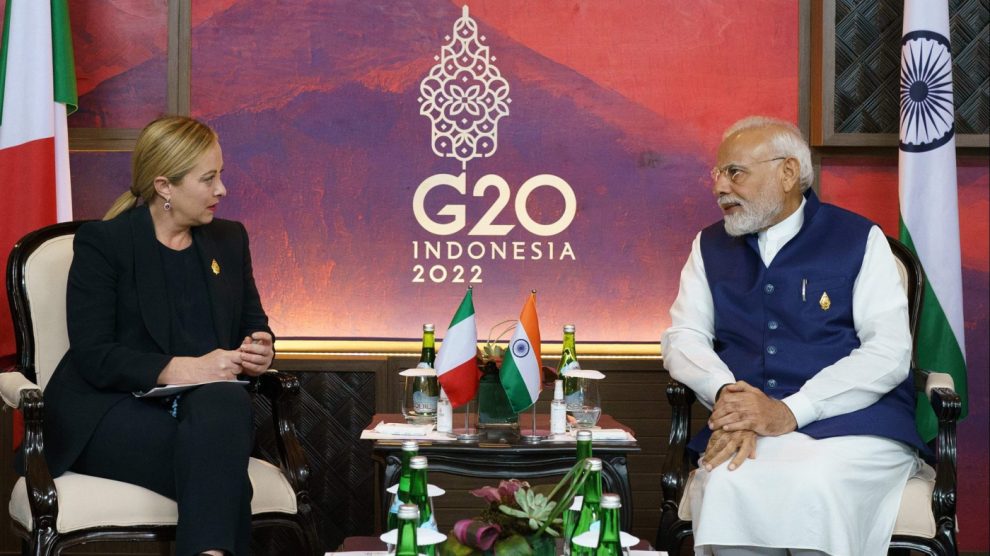Italy’s Prime Minister Giorgia Meloni is scheduled to land in New Delhi to inaugurate the Raisina Dialogues on March 2 as the chief guest with Indian PM Narendra Modi, with whom she will also hold bilateral meetings. The last visit of an Italian PM to India was that of Paolo Gentiloni in 2017, and Mr Modi visited Italy for the October 2021 G-20 summit. As per Ms Meloni, she is Italy’s first female PM and, at 45, the second-youngest.
Ms Meloni’s visit to India is significant, as it continues PM Draghi’s efforts to bring the two democracies closer together and create a substantial alternative to China in India, both as a market and as a friend-shoring destination. During Mr Draghi’s term, Italy began to seriously recognise the dangers that China posed for its democracy, economy and technology and started taking concrete steps to counter China’s aggression. He also implemented a concrete foreign policy in Rome, which his predecessors had largely ignored.
Ms Meloni, instead, has started her term with a clear objective of building on Mr Draghi’s efforts and bringing back Italy’s status as one of Europe’s leaders. Her visit to India is a part of her global strategy to make Italy count as a global player.
In her first 100 days, apart from ensuring energy independence from Russia and formalising and consolidating Italy’s role in NATO and the transatlantic alliance, she has also put her “Mattei Plan” for Africa into place. It aims to turn Italy into Europe’s energy hub, its gas supplier from North Africa, creating a strategic alternative to Russia by sourcing it from Azerbaijan, Algeria, and eventually Libya and Israel. If Ms Meloni’s plan bears fruit, Italy will be able to receive between 50-70 billion cubic metres of gas by 2025, not only to wean it off Russian gas completely but also giving it a significant surplus to supply neighbouring countries such as Austria. Most importantly it wrests EU energy leadership from Germany which has been a key player in the supply of Russian gas to all EU countries given it controls the pipelines from Russia.
Most important, however, is the competition between the three European powers – France, Germany and Italy – for leadership in the European Union. So far, the EU has been dominated by the Franco-German axis. French President Emmanuel Macron, who hails from a very different political party than the Italian PM, would like to see her fail. Not only did Ms Meloni’s leadership start with a spat with Mr Macron on the issue of migrants, but he also excluded her from a hastily-organised dinner for Ukrainian President Zelensky at the Elysée Palace – where the German Chancellor Olaf Scholz was invited.
However, Ms Meloni has risen above these petty snubs, reminding Mr Macron that such politics divide Europe and don’t unite it. In a geopolitical scenario where the world is polarised between democracies and autocracies, and China looks to be siding with Russia, the timing of Ms Meloni’s visit to India could not have been more opportune.
The visit will lay the basis for two countries which share an ancient relationship and have no colonial animosity to develop a mutually-beneficial bilateral partnership. Both countries have vast coasts, and Italy has strong marine and defence technology. Ms Meloni and her party, Brothers of Italy (FdI), strongly support Taiwan. Both India and Italy have strong business links with China and need to balance checking China with their own economic interests. Despite India sharing a contentious 3400 km border with China, both countries, despite their skirmishes and conflicts, manage to balance trade relations. Ms Meloni will look for such a balanced relationship with India, while also taking comfort in the possibility of leaning on a large country where Italian companies can outsource manufacturing (“friend-sourcing”) and work together on supply chain resilience.
Both countries strongly depend on family-owned enterprises, SMEs and agriculture. While the stalled EU-India Free Trade Agreement does not allow Italy and India to sign a bilateral agreement on the topic, India is an open market for Italian agrifood processing companies to set up production and sell technology for the domestic market. By 2030, 500 million Indians will be between the ages of 15-35, making India a large market for fashion, textiles, accessories and makeup, in which Italy excels. India is also undergoing an unprecedented infrastructure expansion where ports, highways, airports and railways are being modernised, all areas where Italian companies are technology leaders and trailblazers.
While India shares a strong relationship with France, as Mr Modi does with Mr Macron, it will do well to look at Italy as its European champion in a “post-Macron” world. PM Meloni and Italy may be an alternative ally for India, given Italy’s increasing leadership in Europe.
Finally, India isn’t a stranger to female leaders; in fact, it welcomes them. Giorgia Meloni brings a woman’s touch to Italy, which has been dominated by male leaders who have been unable to solve its basic problems or restore its rightful place in the global geopolitical scenario. The Meloni-Modi partnership may hold the key to the future of the EU-India partnership in security, the Indo-Pacific, supply chain resilience as well as peace. While India takes its place with the global powers, PM Meloni’s Italy will be the partner that makes the difference.




